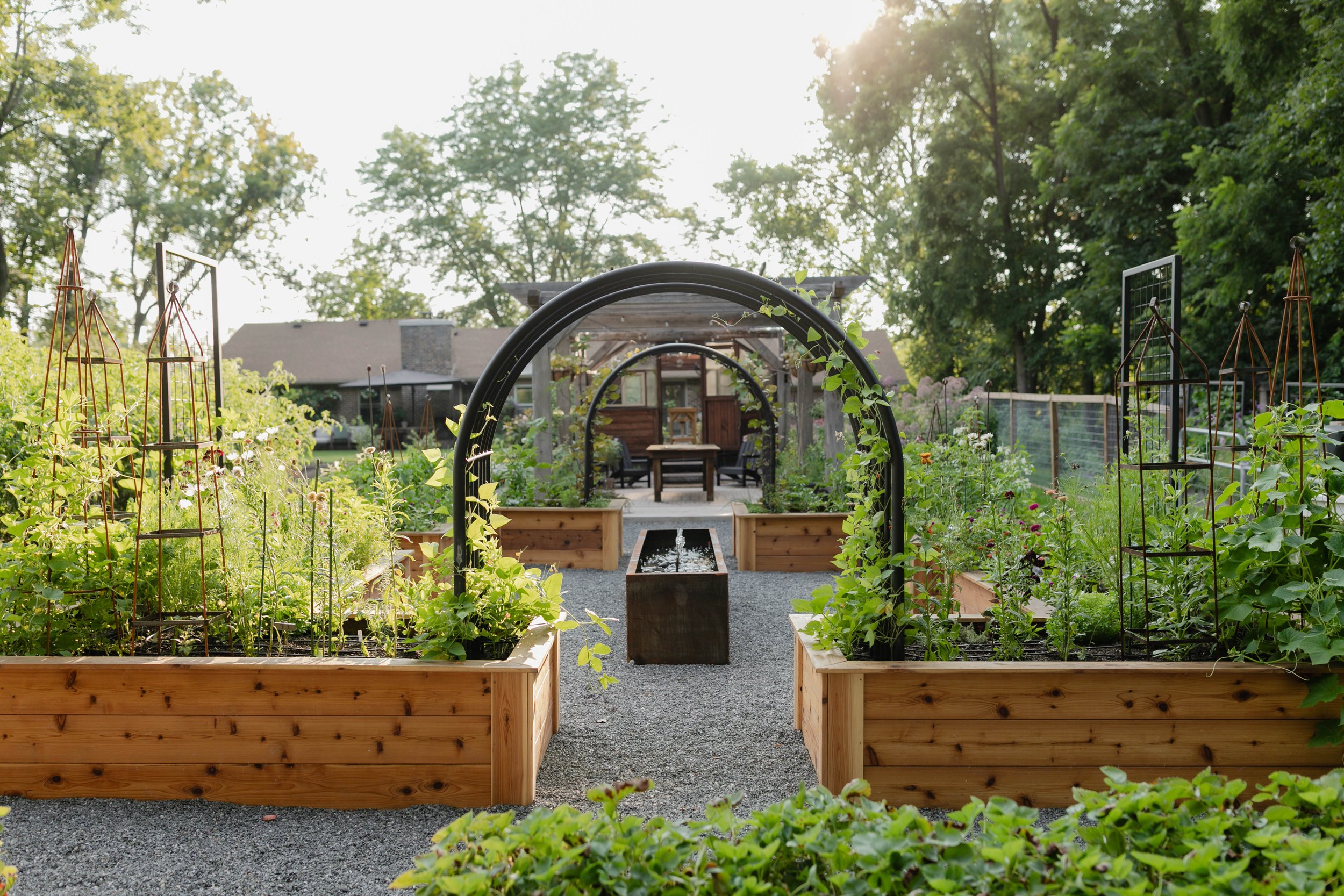Why You Need a Garden Consultant
For the past five years I’ve been a garden consultant, designing and creating organic kitchen gardens for families who want to live a healthier, more vibrant lifestyle. When it comes to creating a beautiful outdoor space on your property, a garden is often just one aspect of the bigger picture.
While it may be tempting to cut corners and just have your landscaper put in a garden rather than hire a garden specialist, those decisions may come back to haunt you. I’ve rehabbed many raised beds that were installed by professionals who had no experience in growing edible fruits and veggies. What seems like an easy, cheaper decision on the front end often results in a lot of wasted time and money.
What does a garden consultant do?
Garden consultants are experts for a reason. We think about your soil quality, we understand companion planting, we source healthy, organic plants, and so much more. We want your gardens to thrive, so we set you up for success right from the start. Here are more reasons why a garden consultant is a valuable resource.
Soil Quality Matters
You might think dirt is dirt. But the health of your garden soil is directly related to the health of the fruits and veggies you’re growing, so it’s important that you are growing in a nutrient-rich soil blend. If a garden is failing, the first thing I look at is the quality of the soil. I recently helped a kitchen garden client completely clear out her raised beds and start over with new soil because her garden wouldn’t take. The reason why? Her landscaper filled her raised beds with dirt. After refilling the beds with my own mixture of healthy soil, compost, and soil amendments, this gardener is already seeing more growth than last season.
Proper Irrigation
I see a lot of gardeners struggling to know how much to water their gardens, and both overwatering and underwatering can be critical mistakes. Many landscaping professionals may overlook or inadequately address irrigation needs, leading to inconsistent watering which puts stress on your plants. I often come across overhead watering systems or misters, but these watering methods are not suitable for growing edible plants. As a garden consultant, I prioritize irrigation management to ensure your plants receive the right amount of water at the right times. From drip irrigation systems tailored to your garden's layout to showing you how to test your soil for water content, I implement strategies to optimize water distribution and minimize waste. The proper irrigation set up is crucial to a thriving garden.
Decide What to Grow in Your Garden
What is the point of growing veggies if you’re not going to eat them? I think it makes sense to grow foods you know your family will enjoy. Often, I'll visit a garden and find that the client's plant choices don't truly reflect their preferences or support their health goals. Instead, they've planted what they saw at the nursery or what they were told they should grow.
This is where the true value of working with a professional comes in. Clearly defining your goals can transform your gardening experience. That's why during the initial consultation, we delve deep into these details to ensure your vision aligns perfectly with your garden.
Creating a Gardening Strategy
Understanding details like which plant varieties thrive in your local climate, what plants need vertical growing support, and germination times, is crucial. Working with a garden consultant involves strategic planning so you can reach your garden goals. It's not just about choosing plants; it's about timing them according to the seasons and supporting healthy growth.
Succession planting is key to maximizing your garden's productivity year-round. Don't limit yourself to the traditional gardening seasons dictated by the industry, which says we can only grow from Memorial Day to Labor Day. With the right guidance and plant support, you can extend your growing seasons and enjoy homegrown harvests for most of the year through succession planting.
Designing a Garden Layout
During assessments, we often encounter gardens needing layout adjustments to truly align with clients' goals. The right setup is essential for an enjoyable gardening experience. We prioritize ease of maintenance and aesthetic appeal to create a functional and beautiful kitchen garden.
I always hate hearing it, but I’ve had many gardeners tell me they were unaware that certain plants in their garden required trellising or vertical support. Instead, they were advised to simply sow seeds without considering the plant's growth habits.
Making sure you have the proper kitchen garden setup and layout to meet your garden goals is key to enjoying your garden experience. Garden consultants specialize in maximizing yield even in limited spaces. I can teach you how to optimize your space by considering factors like water, sunlight, container gardening options, and vertical growth so your garden reaches its fullest potential.
Prioritizing Sustainable and Organic Growing
Prioritizing sustainable and organic growing practices is essential for a thriving garden. As garden consultants, we specialize in these methods to ensure a healthier ecosystem for your plants. From selecting the right plant varieties to implementing natural pest control techniques, we're here to guide you every step of the way. Our personalized approach includes troubleshooting and problem-solving tailored to your garden's specific needs. For example, when dealing with downy mildew, we recommend resistant basil varieties and other suitable options to mitigate potential issues. With our expertise, you can cultivate a garden that flourishes naturally, reducing reliance on synthetic chemicals and promoting long-term sustainability.
Investing in a garden consultant can make all the difference in creating a thriving and sustainable kitchen garden. Don't settle for shortcuts or guesswork; let a garden consultant like me set you up for success and guide you every step of the way on your unique gardening journey. Ready to transform your outdoor space? Book a consultation with me today and let's dig in.







